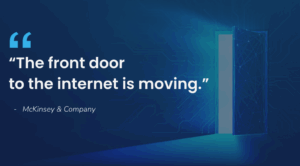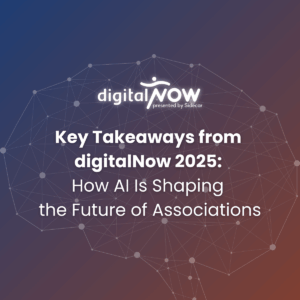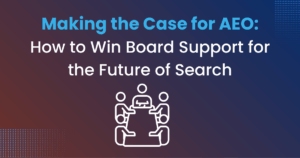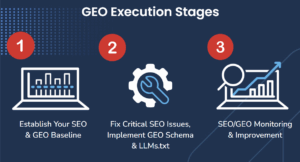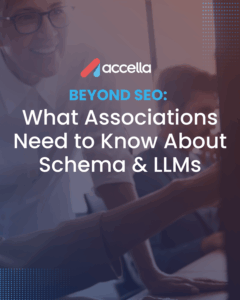For more than a decade, PDFs have been the go-to format for associations to publish important content, from position papers to annual reports, toolkits to research summaries. But as digital behavior shifts and AI tools become the first stop for information discovery, PDFs are becoming a liability.
If your most important content is trapped in a static document, your content is not just harder to find, it is often invisible.
New to Accella? Meet the Minds Behind AEO: 5 Perspectives Guiding the Future of Search
PDFs Are a Black Hole to AI
When AI tools like ChatGPT or Google’s Search Generative Experience (SGE) decide what to surface in response to a question, they prioritize structured, trustworthy content that is easy to parse, segment, and cite. That is not a PDF.
Merrik Kresley – The Optimizer
“A PDF has no hierarchy. No context. No semantic markup. It’s essentially a flat file, and most AI crawlers ignore it unless it’s been manually unpacked. Even then, the results are unpredictable. You wouldn’t expect a search engine to recommend a black box. AI models work the same way.”
What’s worse, PDFs aren’t just ignored by generative tools, they’re often poorly indexed by internal search as well. This means your members can’t find what they need on your site, and external tools can’t recommend your expertise.
From Locked Documents to Living Content
To make your content AI-ready, format matters just as much as message. Content needs to be structured using headings, paragraphs, metadata, and schema that help both search engines and AI models understand what it is and when it’s useful.
Evan Brand – The Builder
“We recently helped an association convert their flagship resource library from PDF’s to structured web content. The result? A 40% increase in internal search engagement and nearly double the time-on-page. Members didn’t just find the content, they actually used it.”
Evan emphasizes that structure isn’t about aesthetics, it’s about performance. Structured content makes personalization easier, improves accessibility, and allows content to be reused across platforms.
Strategy, Not Just SEO
Jason King – The Big Picture Thinker
“This isn’t about chasing Google rankings. It’s about how associations lead. If your content isn’t being seen in the places people are searching, or being cited when questions are asked, your influence is shrinking.”
Jason’s point is key: PDFs are not just a technical limitation, they signal a broader disconnect between how associations publish content and how audiences consume it. If your organization believes it is the voice of your industry, but your content is structurally excluded from AI tools, you’re handing that leadership position to someone else.
The Governance Gap
Moving away from PDFs isn’t just about uploading the same content in a new format. It requires rethinking how content is created, reviewed, and published.
Alyssa Hulka – The Systems Thinker
“In most associations, publishing is fragmented. Some teams still produce PDFs because that’s what they know. Others are using WordPress or Drupal but without any standards for metadata or schema. What’s missing is governance, a shared understanding of how content should be structured and maintained.”
Alyssa recommends starting with one pilot area: identify a content type (like position statements or technical guidance), agree on a structure, and build a repeatable publishing process. This creates a model that can scale across departments.
What Associations Can Do Today
- Audit your PDF usage.
Where are they being used? Which are still actively promoted or downloaded? Which are most valuable to members? - Identify content worth converting.
Don’t try to tackle everything at once. Focus on high-impact documents that support core areas like advocacy, research, or membership. - Build a publishing framework.
Use structured headings, semantic HTML, and schema like Article, FAQ, or HowTo. Tools like WordLift or Schema.org markup generators can help. - Train your content authors.
Templates and tools can only go so far. Invest in training so your teams understand how their publishing habits affect search visibility and member experience.
Final Word from the Strategist
“Associations have incredible expertise, but the format is failing the message. PDFs served a purpose in an earlier digital age. Today, they are holding you back. AEO isn’t just about being found, it’s about being referenced, trusted, and remembered.”
— Kelsey Mills
Check out the rest of our AEO blog series:
“Meet the Minds Behind AEO: 5 Perspectives Guiding the Future of Search” Read Blog
“What Is Answer Engine Optimization?” Read Blog
“The Death of the PDF: Why AI Can’t Find You” Read Blog
“Why Associations Need to Budget for AEO in 2026” Read Blog
“Your AEO Webinar Replay + Complimentary AI Search Readiness Report” Watch Webinar
Curious how visible your content is in AI search?
Ask about our AEO Visibility Audit.
Talk to the Accella Team


